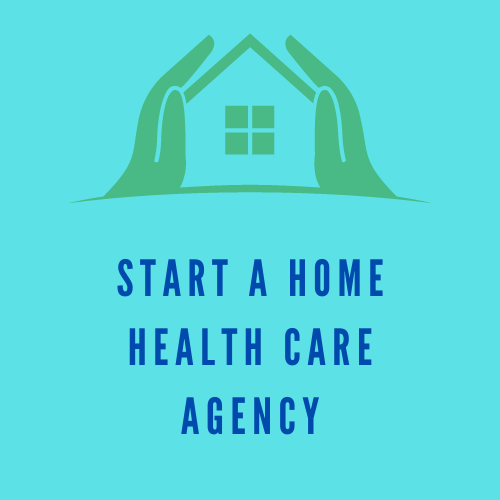Starting a home health care agency requires careful planning and a solid understanding of the industry and regulations. Here are some steps to start a home health care agency:
- Conduct research and market analysis: Assess the demand for home health care services in your area and identify the needs and preferences of your target market.
- Develop a business plan: Outline your vision, mission, goals, and strategies for starting and running a successful home health care agency.
- Obtain licensing and certifications: Meet the state and federal regulations for operating a home health care agency.
- Build a team: Hire experienced and qualified healthcare professionals, including registered nurses, therapists, and home health aides.
- Establish relationships with healthcare providers and community resources: Collaborate with healthcare providers and community resources to provide comprehensive care to clients.
- Develop care plans: Work with clients and their families to develop personalized care plans that meet their unique needs and preferences.
- Implement quality assurance and risk management processes: Ensure the safety and comfort of clients by implementing processes to monitor and improve the quality of care.
- Market your services: Promote your services to potential clients, healthcare providers, and referral sources.
Now, we will discuss the above contents in detail.

Conduct research and market analysis
Conducting research and market analysis is an essential step in starting a home health care agency. It helps to assess the demand for home health care services in your area and identify the needs and preferences of your target market.
To conduct market research, you can start by gathering data and information on the following:
1.) Demographic information: Learn about the age, income, health status, and other relevant characteristics of the potential clients in your area.
2.) Competition analysis: Identify the existing home health care agencies in your area and analyze their strengths, weaknesses, and market share.
3.) Market size: Determine the size of the potential market for home health care services in your area.
4.) Industry trends: Keep up to date with the latest industry trends and developments to understand the changing needs and preferences of your target market.
Once you have collected the data and information, you can use it to create a comprehensive market analysis report that includes:
1.) Market segmentation: Divide the market into different segments based on demographic characteristics, health status, and other relevant factors.
2.) Target market: Identify the specific segments of the market that are most likely to use your services.
3.) Market trends: Analyze the trends and patterns in the demand for home health care services in your area.
4.) Market demand: Estimate the demand for home health care services in your area, based on the size of the target market and the trends in market demand.
By conducting a thorough market analysis, you can gain a better understanding of the demand for home health care services in your area and identify the needs and preferences of your target market. This information will help you to develop a more effective business plan and marketing strategy for your home health care agency.

Develop a business plan
A business plan is a crucial component of starting and running a successful home health care agency. It outlines your vision, mission, goals, and strategies for achieving success and provides a road-map for growth and sustainability. A well-written business plan will help you secure funding, attract the right employees and clients, and track progress over time. Here are the key elements to include in your home health care agency business plan.
Outline Your Vision and Mission
The first step in developing your business plan is to define your vision and mission. Your vision statement should describe the future that you want to create for your home health care agency, while your mission statement should articulate the purpose and values of your business.
For example, your vision statement might be: “To be the leading provider of compassionate, personalized home health care services in our community.”
Your mission statement might be: “Our mission is to improve the quality of life for our clients by providing compassionate, personalized care and support that promotes independence, dignity, and safety.”
Set Clear Goals and Objectives
Once you have defined your vision and mission, it’s time to set clear goals and objectives for your home health care agency. These should be specific, measurable, attainable, relevant, and time-bound.
Examples of goals for your home health care agency might include:
· To secure Medicare certification within the first year of operation
· To provide home health care services to 100 clients within the first year
· To generate $500,000 in revenue within the first three years
· To expand services to additional states within five years
Develop Strategies for Success
Your business plan should also include strategies for achieving your goals and objectives. This includes identifying your target market, developing a marketing and sales plan, establishing partnerships with healthcare providers and community resources, and implementing quality assurance and risk management processes.
For example, your marketing and sales strategy might include:
· Developing a referral network with healthcare providers, community organizations, and other related businesses
· Creating a website and social media presence to promote your services and engage with clients and families
· Offering free assessments and consultations to potential clients to generate leads and build relationships
· Participating in local health fairs and community events to raise awareness and educate the public about your services
Financial Projections
Finally, your business plan should include financial projections that provide a realistic estimate of your start-up costs, operating expenses, and revenue potential. This includes creating a budget and cash flow projections, as well as identifying potential sources of funding and the steps required to secure them.

Obtain licensing and certifications
One of the most important steps in starting a home health care agency is obtaining the necessary licensing and certifications. This ensures that you meet the state and federal regulations for operating a home health care business and are able to provide quality services to your clients.
Here are the key steps to obtain the necessary licensing and certifications for your home health care agency:
1.) Research State Requirements
Each state has different licensing requirements for home health care agencies, so it’s important to research the regulations in your state. You can find this information on the state health department’s website or by contacting the appropriate state agency.
2.) Obtain a Business License
To operate a home health care agency, you will need to obtain a business license from your state. This typically involves completing an application, paying a fee, and providing documentation such as proof of insurance and background checks for employees.
3.) Meet Federal Requirements
In addition to state licensing requirements, home health care agencies are also subject to federal regulations. This includes meeting the requirements of the Medicare and Medicaid programs, as well as the conditions of participation for home health agencies.
4.) Seek Accreditation
While not required by law, obtaining accreditation from a recognized organization such as Certified Homecare Consulting can demonstrate your commitment to quality and provide assurance to clients and families that you meet high standards for care.
5.) Complete Employee Training
Finally, it’s important to ensure that all employees are properly trained and meet the licensing and certification requirements for their specific role. This may include certifications for nursing, home health aide, and other related fields.

Build a team
One of the key components of a successful home health care agency is having a talented and dedicated team of healthcare professionals. This includes registered nurses, therapists, and home health aides who are experienced and qualified to provide high-quality care to your clients.
Here are some tips for building a strong team for your home health care agency:
1.) Define Your Staffing Needs
Before hiring staff, it’s important to assess your staffing needs and determine the type of healthcare professionals you will need to provide the services your agency offers. This may include registered nurses, licensed practical nurses, physical therapists, occupational therapists, speech therapists, and home health aides.
2.) Hire Experienced Professionals
When hiring staff, look for healthcare professionals who have relevant experience in the field and a passion for providing quality care. Consider their education, training, and previous work experience to ensure they are qualified for the job.
3.) Offer Competitive Benefits and Salaries
To attract and retain top talent, it’s important to offer competitive benefits and salaries. This may include health insurance, paid time off, and other benefits that can help attract and retain the best employees.
4.) Foster a Positive Work Culture
A positive work culture is essential for attracting and retaining top talent. This includes fostering open communication, providing opportunities for professional development, and promoting a work-life balance.
5.) Provide Ongoing Training
Finally, it’s important to provide ongoing training and professional development opportunities to ensure that your staff remains up-to-date on the latest techniques and technologies in the field.

Establishing Relationships with Healthcare Providers and Community Resources
Collaboration between healthcare providers and community resources is essential for providing comprehensive care to clients. This involves building relationships with healthcare providers and community resources to ensure that clients receive the best possible care.
Here are some tips for establishing relationships with healthcare providers and community resources:
1.) Identify Key Healthcare Providers and Community Resources
The first step in establishing relationships with healthcare providers and community resources is identifying the key players in your area. This may include hospitals, primary care physicians, specialist physicians, rehabilitation centers, community organizations, and government agencies.
2.) Attend Networking Events
Attending networking events and conferences can be an effective way to connect with healthcare providers and community resources. This provides an opportunity to introduce your agency and its services and to learn more about the services and resources available in your area.
3.) Develop Referral Relationships
Developing referral relationships with healthcare providers and community resources can help ensure that clients receive the best possible care. This involves working closely with healthcare providers and community resources to coordinate care and provide clients with a seamless transition between different levels of care.
4.) Participate in Community Outreach Programs
Participating in community outreach programs can help build relationships with healthcare providers and community resources. This can include participating in health fairs, community events, and other programs that provide information and resources to the community.
5.) Foster Collaboration
Finally, it’s important to foster collaboration between healthcare providers and community resources. This involves working together to develop care plans and to coordinate services to meet the needs of clients.

Developing Care Plans
Developing care plans is a crucial part of providing in-home care services to individuals. A care plan outlines the specific services and support that a client needs to maintain their independence, dignity, and quality of life.
Here are some steps to follow when developing care plans:
1.) Assess the Client’s Needs and Preferences
The first step in developing a care plan is to assess the client’s needs and preferences. This may involve conducting a comprehensive evaluation of the client’s physical, emotional, and social needs, as well as their ability to perform daily living activities.
2.) Work with the Client and their Family
It’s important to work closely with the client and their family when developing a care plan. This involves taking into account their preferences and goals, as well as any cultural or religious beliefs that may impact their care.
3.) Develop a Personalized Plan of Care
Based on the assessment of the client’s needs and preferences, a personalized plan of care is developed. The plan should outline the specific services and support that the client needs, including the frequency and duration of care, and any necessary modifications to the client’s home environment.
4.) Regular Review and Updates
The care plan should be reviewed regularly and updated as necessary. This may involve reassessing the client’s needs and preferences and making any necessary changes to the plan to ensure that it continues to meet their needs.
5.) Collaborate with Healthcare Providers
Finally, it’s important to collaborate with healthcare providers when developing care plans. This involves working closely with healthcare providers to ensure that the care plan is consistent with any medical treatments or therapies that the client is receiving.

Implementing Quality Assurance and Risk Management Processes
Quality assurance and risk management processes are crucial for ensuring the safety and comfort of clients receiving in-home care services. These processes help to monitor and improve the quality of care provided to clients, as well as identify and mitigate any potential risks.
Here are some steps to follow when implementing quality assurance and risk management processes:
1.) Develop Policies and Procedures
The first step in implementing quality assurance and risk management processes is to develop policies and procedures that outline the standards and procedures for providing care to clients. These policies and procedures should be based on industry standards and regulations, as well as the specific needs and preferences of clients.
2.) Monitor Care Delivery
Regular monitoring of care delivery is essential to ensuring that care is being provided in accordance with the policies and procedures outlined in the care plan. This may involve conducting regular evaluations of the care provided to clients, as well as monitoring any changes in their physical, emotional, or social needs.
3.) Foster a Culture of Quality
It’s important to foster a culture of quality within the home health care agency. This involves promoting a commitment to providing high-quality care, as well as providing ongoing training and development opportunities for healthcare professionals.
4.) Identify and Mitigate Risks
Quality assurance and risk management processes should also involve identifying and mitigating any potential risks to clients. This may involve conducting regular assessments of the home environment, as well as monitoring any changes in the client’s physical or emotional health.
5.) Implement Feedback and Complaint Processes
Finally, it’s important to implement feedback and complaint processes to ensure that clients and their families have an opportunity to provide feedback on the care they receive. This feedback can be used to make improvements to the care provided and to identify any potential risks to clients.

Marketing Your Services
Marketing your home health care services is a critical aspect of building a successful agency. The goal of marketing is to promote your services to potential clients, healthcare providers, and referral sources in order to build awareness, attract new clients, and grow your business.
Here are some steps to follow when marketing your home health care services:
1.) Develop a Marketing Plan
The first step in marketing your home health care services is to develop a marketing plan. This plan should outline your target audience, marketing strategies, and budget. It should also include specific goals and objectives for your marketing efforts.
2.) Build a Strong Online Presence
Building a strong online presence is essential for promoting your home health care services. This may involve creating a website, establishing a social media presence, and building a strong online reputation through positive reviews and testimonials.
3.) Network with Healthcare Providers and Referral Sources
Networking with healthcare providers and referral sources can be a valuable source of referrals for your home health care agency. This may involve attending industry events, reaching out to healthcare providers, and building relationships with local hospitals, clinics, and rehabilitation centers.
4.) Utilize Direct Marketing Strategies
Direct marketing strategies, such as direct mail campaigns and email marketing, can be effective for promoting your home health care services to potential clients. These strategies allow you to reach your target audience directly, building awareness of your services and encouraging potential clients to take action.
5.) Offer Community Outreach Programs
Offering community outreach programs, such as educational seminars and support groups, can help to build awareness of your home health care services and attract new clients. These programs can also provide an opportunity to network with healthcare providers and referral sources.

Starting a home health care agency can be a rewarding and fulfilling endeavor. However, it is important to approach this venture with careful planning and a strong commitment to providing high-quality care to your clients. This article has provided a comprehensive overview of the steps you need to take to start and run a successful home health care agency, including conducting market research, developing a business plan, obtaining licensing and certifications, building a team, establishing relationships with healthcare providers and community resources, developing care plans, implementing quality assurance and risk management processes, and marketing your services.
By following these steps, you will be well on your way to starting a home health care agency that provides compassionate, personalized care to clients who need it. However, it is important to remember that every home health care agency is unique, and your specific needs and goals may differ from others. If you would like to get a more personalized and complete business plan, please leave a message in the comments to tell us what your needs are. We would be happy to help you develop a plan that meets your specific goals and provides you with the support you need to succeed.
(Note: Is this article not meeting your expectations? Do you have knowledge or insights to share? Unlock new opportunities and expand your reach by joining our authors team. Click Registration to join us and share your expertise with our readers.)
